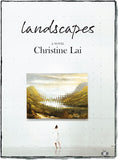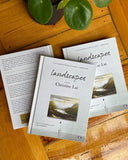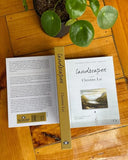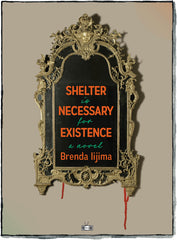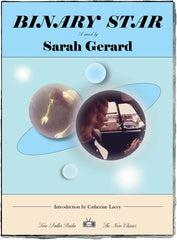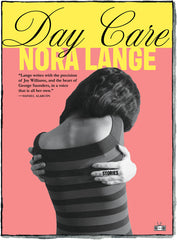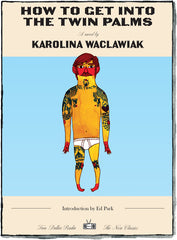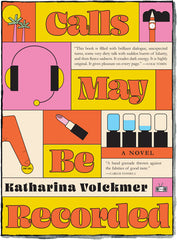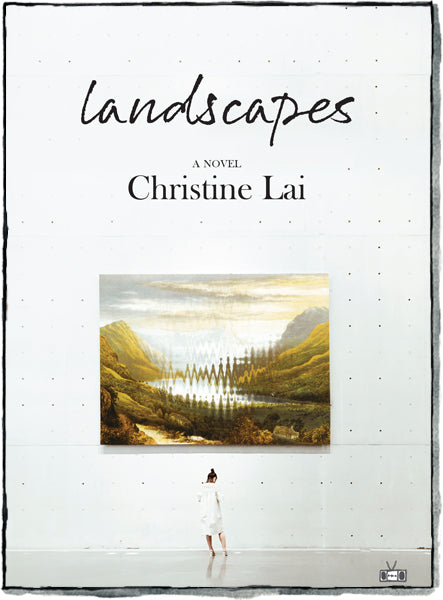 CLICK TO REQUEST AN ARC
CLICK TO REQUEST RIGHTS INFO
VIEW/DOWNLOAD COVER ART FILE
VIEW/DOWNLOAD AUTHOR PHOTO
VIEW ON EDELWEISS
CLICK TO REQUEST AN ARC
CLICK TO REQUEST RIGHTS INFO
VIEW/DOWNLOAD COVER ART FILE
VIEW/DOWNLOAD AUTHOR PHOTO
VIEW ON EDELWEISS
Landscapes
a novel by
Christine Lai
ABOUT

* 2024 CLMP Firecracker Awards for Independently Published Literature, Finalist
* 2023 Republic of Consciousness Prize, Finalist
* A Best Book of the Year —NPR, CBC, Nerdette, Independent Book Review
* An October 2023 ABA "Indie Next List" Pick.
* A Publishers Weekly's "Writers to Watch" (Fall 2023)
An entrancing and prismatic debut novel by Christine Lai, set in a near future fraught with ecological collapse, Landscapes brilliantly explores memory, empathy, preservation, and art as an instrument for recollection and renewal.
In the English countryside—decimated by heat and drought—Penelope archives what remains of an estate’s once notable collection. As she catalogues the library’s contents, she keeps a diary of her final months in the dilapidated country house that has been her home for two decades and a refuge for those who have been displaced by disasters. Out of necessity, Penelope and her partner, Aidan, have sold the house and its scheduled demolition marks the pressing deadline for completing the archive. But with it also comes the impending return of Aidan’s brother, Julian, at whose hands Penelope suffered during a brief but violent relationship twenty-two years before. As Julian’s visit looms, Penelope finds herself unable to suppress the past, and she clings to art as a means of understanding, of survival, and of reckoning.
Recalling the works of Rachel Cusk and Kazuo Ishiguro, Landscapes is an elegiac and spellbinding blend of narrative, essay, and diary that reinvents the country house novel for our age of catastrophe, and announces the arrival of an extraordinarily gifted new writer.
Additional reading:
Necessary Fiction presents "Research Notes" by Landscapes author Christine Lai (September 15, 2023): The Research Notes series invites authors to describe their process for a recent book, with “research” defined as broadly as they like.
Read an excerpt:
Electric Literature presents "An Archivist for the End of the World," an excerpt from Landscapes by Christine Lai, recommended by Ayşegül Savaş.
Reviews
Scroll to bottom for Goodreads reviews.
"Exquisite... Immersed in the works of Turner throughout, Landscapes likens one character (Julian) to Turner’s shadows, another (Aidan) to his light, and Penelope to a place between light and dark, appearing and disappearing—which, in Landscapes, is the place where writing happens. To exist between collapse and renewal, in other words, is to live with an awareness that destruction has always been with us; the choice, Lai has suggested, is not between beauty and rot but whether to see their proximity to each other. There is some hope in this way of seeing. The closer Penelope looks at disaster, the more she sees acts of reparation, resilience in the face of loss."
—Scott Schomburg, Public Books
REVIEW: "Writing Between Collapse and Renewal: Christine Lai’s Landscapes"
Landscapes by Christine Lai is a finalist for the 2023 Republic of Consciousness Prize for small presses in the US and Canada.
—> Read the Jan 30, 2024, press release: "$35,000 Republic of Consciousness Prize Announces Longlist of Independent Presses in United States and Canada — 10 Fiction Books from Small, Independent Presses Acknowledged for Literary Merit"
* Landscapes is an October 2023 "Indie Next List" Pick from The American Booksellers Association: "The 25 October Indie Next List Picks"
* Christine Lai is a Publishers Weekly's "Writers to Watch" (Fall 2023):
"Lai wanted to write a country house novel that subverts the glamor of depictions like that of Downton Abbey. She was influenced by W.G. Sebald’s narratives of houses similar to Mornington, which required for their construction the devastation of landscapes and villages. 'I was fascinated by this idea that something that appears very beautiful and respectable is in fact complicit in this history of destruction.'"
—Matt Seidel, Publishers Weekly
"Writers to Watch Fall 2023: This season’s crop of promising debut fiction offers timeless human dramas from fresh perspectives."
"Just now I’m reading Landscapes by Christine Lai... She has a very special way of writing about violence, loss, and memory."
—Jenny Erpenbeck, author of Kairos, longlisted for the International Booker Prize 2024
From "A Q&A with Jenny Erpenbeck and Michael Hofmann, author and translator of Kairos" (April 2024)
"I think you did a marvelous job in this book in terms of showing us the resilience of nature and the resilience of art but also their fragility as well and it's just a really interesting, I think, depiction of hopefully not where we're going as a society but a really thoughtful and thought-provoking book."
—Lori Feathers with co-host Sam Jordison, Across the Pond podcast
INTERVIEW AND READING: Christine Lai, "Landscapes" (Nov 28, 2023)
"Working against time to catalog artists and storytellers before the building is demolished, [Penelope's] archive becomes a diary of solace and poignant recollection until she learns Julian—Aidan’s brother and Penelope’s rapist—is returning to see his former home one last time. As she writes an elegy of preservation, Penelope navigates a prosaic detour around her future shock."
—Marcela Davison Avilés, NPR
Books We Love (2023), NPR’s interactive reading guide
"A major focus of this novel is destruction and what it means to create anew; destruction often is not the end but a site for rebirth. Though Penelope has devoted so much of her life to the preservation of [an art archive], in its demolition, she is able to transition into a new future…"
—Samantha Hui, Independent Book Review
"The Best Books We Read in 2023"
"A book of quiet beauty about archiving, art criticism, William Turner, loss, and the climate apocalypse. I loved the nuances and many layers of the narrative, the pacing, and Lai’s concise and hypnotic prose."
—Babak Lakghomi, author of South, for Heavy Feather Review
"'Cheers to the Weirdos! Part Deux': Jesi Bender Presents a Heavy Feather Favorites List for 2023"
"Landscapes is a novel set in our world in the near future amidst ecological disaster. Told through the narrative of Penelope as well as diary entries, Landscapes blends the country house novel with geopolitics."
—CBC
"Books of the Year: The best Canadian fiction of 2023"
"Andrew loved this book, which explores the futility and importance of preserving and archiving art at the end of the world. 'It really made me think about why we care about art—any sort of art—in the face of all these major things happening in the world,' he says. Largely told in the form of journal entries from an archivist living on a crumbling estate, this book is for art lovers and the apocalypse-curious alike. 'It did make me wanna just walk around museums and look at the different pieces that are unpacked in this one,' Greta says."
—Greta Johnsen, WBEZ Chicago, with Andrew Limbong
"The best books of 2023: Nerdette's picks"
"I loved this kind of tension that you had between showcasing decay, next to beauty, you know, death, next to life, possibility..."
—Phillip Russell and Ben Thorp, Origin Story Podcast
Interview: "How Art Endures Even After Apocalypse" (Oct 3, 2023)
"In the process of rereading Penelope’s analytical entries, I noticed that the precise locations of each insertion serve as an ingenious sort of plot device. See, after a point, the reader can surmise that Penelope herself is a survivor of assault. She can’t help but to carefully analyze art as she does; it’s how she heals and makes sense of the world... The most avid readers will have a hard time believing that Landscapes is a debut novel."
—S. Elizabeth Sigler, The Common
Review: Landscapes by Christine Lai
"Landscapes is ever-conscious of the ephemeral nature of art, and our particular experiences of it... 'Mornington Hall was famed for its seamless transition between interior and exterior,' Penelope tells us. The same could be said for the book as a whole—Landscapes moves deftly across multiple other dichotomous divides."
—Nikki Barnhart, The Journal
—> REVIEW: Review of Landscapes by Christine Lai
—> INTERVIEW: "Impressions of Time: An Interview with Christine Lai" (Jan. 21, 2024)
"[Landscapes] is what they call a many-layered book; [Christine Lai] does a wonderful job of layering... I hope you get a chance to read it."
—Peg the Book Prize Addict, on YouTube
"Republic of Consciousness Prize (US/CAN) / LANDSCAPES by Christine Lai / Two Dollar Press" (Jan 11, 2024)
"I envy readers entering this world for the first time. You will find beauty here, and wisdom."
—Ayşegül Savaş (author of White on White), Electric Literature
"An Archivist for the End of the World": An excerpt from Landscapes, Recommended by Ayşegül Savaş"
"The story of an archive—discovered in not only what it preserves, but what it leaves out—is compelling, and Landscapes has a lot to say about art, ruins, and beauty."
—Amanda Paige Inman, Interview Magazine
Interview: "Christine Lai on Archives, Ruins, and Her Debut Novel Landscapes"
"A rich meditation on the burden of remembrance, the ruins of the past, and the ruins that climate crisis will soon bring us, Landscapes is a tightly woven debut that travels easily between epistles, point of view shifts, and art criticism... As much as Landscapes is about destruction and decay, it is equally about picking up the ruins and rebuilding."
—Christina Wood, Full Stop
Review: Landscapes by Christine Lai
"This week, host Jason Jefferies is joined by Christine Lai, who discusses her new novel Landscapes, which is published by our friends at Two Dollar Radio. Topics of discussion include novels about art, what you can learn about a character based on their attitude towards another character's art (through the lens of Nabokov's Pale Fire), whether a critic can ever become a part of the art they are criticizing, Penelope as a name in literature, documentation, climate fiction, capitalism and possession, and much more. Copies of Landscapes can be purchased here with FREE SHIPPING for members of Explore More+."
—Jason Jefferies, Bookin’ Podcast (Presented by Explore Booksellers)
Interview: "255--Bookin’ w/ Christine Lai"
"In the wake of environmental destruction, Penelope is preparing to sell the house she and her partner have lived in for twenty years. While faced with a daunting past and looming future, she turns to art and beauty for home, hope and healing."
—Karla J. Strand, Ms. Magazine
"September 2023 Reads for the Rest of Us"
"Landscapes is a contemplation of beauty and decay, intention and uncertainty. This brilliantly ekphrastic novel invites us to consider the art of many who have come before and grappled with existential challenges in their times—whether Homer’s epics, Turner’s landscapes or Mahler’s symphonies. Just as those artists layered colors, characters, or tonal qualities in their work, Lai combines diary entries, academic critique, archival catalog notes and postcard messages. The resulting narrative encompasses different eras and different viewpoints. Landscapes is an indictment of humanity’s hubris, yes—but it’s also a sumptuous contemplation of the enduring power of art."
—Barbara Lloyd McMichael, Our Coast
The Bookmonger Review: Landscapes by Christine Lai
"Landscapes is deftly textured with journal entries, narrative, art history and criticism. What emerges is a hypnotic novel that meditates on loss and violence. A gorgeous and accomplished debut."
—Wendy J. Fox, Electric Lit
"15 Small Press Books to Read This Fall"
"Christine Lai’s recent debut Landscapes is a beautiful exploration of art, memory, and preservation against the backdrop of ecological disaster in the near future. Told primarily in first-person journal entries, the novel follows art historian and archivist Penelope as she catalogs the collection of art, books, and ephemera at Morningside... Penelope’s journal entries begin in September and continue through spring, as she spends the winter working through the contents of the library, hosting climate refugees in the halls of the great house, and bracing herself to face Julian after all these years."
—Ceillie Clark-Keane, Electric Literature
"9 Literary Mysteries With a Big Winter Mood"
"Lai has offered a comprehensive gallery of ruination that also remarks on the traumatic event to which Penelope repeatedly returns, lingering at the ruins as a way of working through personal crisis... What Lai offers is an incisive exploration in interiority, and in Penelope she presents a character who is, like all of us, a work unfinished."
—Katy Dycus, Necessary Fiction
Review: Landscapes by Christine Lai
"Landscapes, Christine Lai’s debut novel, powerfully combines memory, feminism and environmentalism.... Christine Lai has written a novel of extraordinary power... But the novel also prompts questions about our viewing of art works, our attempts to reckon with the past... and calls us to examine our desire to possess objects, art and people."
—Yana Ellis, Northwest Review
Review: Landscapes by Christine Lai
"With its careful attention to landscape painters and diary entries leading up to the demolition of the house, this is the ultimate piece of fiction about noticing what’s been overlooked."
—Lorraine Berry, Los Angeles Times
"These 8 books will help soothe your climate anxiety by focusing on the little things"
"Rich with allusions to paintings and literature, Landscapes is a quiet, deeply impactful exploration of memory and loss, and art in the face of unimaginable crisis."
—Nirica Srinivasan, Write or Die Magazine
Interview: "On Art In A Time of Crisis, Archiving Language, Fictional Diaries, and Her Debut Novel Landscapes"
"Plenty of books exist about what to do with the art of bad men, but changing the channel and walking on the other side of the street no longer cut it. Christine Lai’s debut novel, Landscapes, offers no illusions about or answers to this problem, but it is a fortifying read nonetheless. Instead of delivering a polemic, Landscapes probes the archive of feminist art for new answers, by blending diary entries, close-third-person narration, and criticism.”
—Grace Byron, The Believer
Review: Landscapes by Christine Lai
"[J.M.W. Turner is] the perfect painter to be studied in a narrative poised on the precipice of great change to its characters’ immediate and global surroundings, and hinging around a single moment of violence in its main character’s past... Lai’s structure and tone deftly but subtly mirror Penelope’s evolving mental and emotional space across the course of the novel... She can no more contain her own trauma and grief by maintaining a clinical remove than she can preserve the rotting artwork and books of the estate by recording them for posterity... We are acute emotional instruments that are nonetheless useless at calculating scale — Penelope’s life has been as shaped by one private act of violence from decades ago as by the planetary violence altering her entire world, and as her own witness, she must accept and acknowledge that if she’s to experience healing. Scale is irrelevant in the face of trauma."
—David Nilsen, On the Seawall
Review: Landscapes by Christine Lai
"Over the years, there’s been a lot of memorable fiction written about sprawling buildings in the countryside. One of those is at the heart of Christine Lai’s novel Landscapes—with the twist here being that Lai’s novel is also set in a near future where climate change has wreaked even more havoc than it has right now, widening societal gulfs and making even the hardiest of structures that much more at risk."
—Tobias Carroll, Tor.com
"Can't Miss Indie Press Speculative Fiction"
"Lai’s writing is exquisite. Lush and personal, it’s also wonderfully poetic and perfectly melancholy... memory and art are used here as ways to try and sort out what’s happening—and happened, to bring them to this point... a spellbinding and unsettling story, and one told with such incredible care and beauty. This was one of my top books read this year."
—Alison Manley, The Miramichi Reader
Review: Landscapes by Christine Lai
"There’s [...] something strangely beautiful and comforting about the ways that Penelope and Aidan are responding to their slow apocalypse: by making their world smaller and helping others, and accepting the heartbreaking temporality of all things, even art."
—Eliza Smith, LitHub
"25 Novels You Need to Read This Fall"
"Lai captures the intersectionality of art, feminism, and environmentalism in this moving debut novel... I deeply enjoyed reading Landscapes... Though the themes of this book are complex, Christine Lai’s writing does not over-complicate the art. Landscapes is beautiful, provocative, and accessible. It will remind you that destruction is rarely the end and that we all must continue forward."
—Samantha Hui, Independent Book Review
Review: Landscapes by Christine Lai
"Using easily approachable prose in the vernacular of the forlorn, we immediately sink into the daily life and ritual of Penelope as the poles of her world, her work and her abuser, come crashing together... What Lai achieves with great success, is the actual process of marking trauma and its lingering uncertainty."
—Thomas Johnson, West Trade Review
Review: Landscapes by Christine Lai
"In Christine Lai’s haunting novel Landscapes, a wounded woman contends with memories, artifacts, loss, and hope... Ethereal and unsparing, Landscapes is a novel about destruction, endurance, and resilience."
—Meg Nola, Foreword Reviews
"In her debut novel, Lai takes inspiration from Sebald to weave a tale of an archivist living and working in the English countryside in the near, climate-change-ravaged future. Art, feminism, and environmentalism collide in this cutting examination of ecological disaster and aesthetic ecstasy."
—Sophia Stewart, The Millions
"September Preview: The Millions Most Anticipated"
"Lai debuts with an intelligent narrative of an archivist living and working in the English countryside in a near future wracked by climate change... Alongside Penelope’s trauma, thoughtfully developed ekphrases show how violence against women has not only been banalized, but positively coded in the tradition of Western painting. The text is an elegant assembly of such descriptions, along with catalogue entries, excerpts from Penelope’s journal, and sections written from Julian’s perspective. Sebald fans should take note."
—Publishers Weekly
Review: Landscapes by Christine Lai
"[Landscapes] builds an electric undercurrent of doom. In cool, sinewy prose, this astute and timely novel explores the roles of beauty, art, and passion in a time of survival."
—Kirkus Reviews
"Landscapes is Lai's first novel set in our world in the near future amidst ecological disaster. Told through the narrative of Penelope as well as diary entries, Landscapes blends the country house novel with geopolitics. "
—CBC Books
"Writers to watch: 30 Canadian writers making their mark in 2023"
"A darkly absorbing, prismatic debut novel from Christine Lai, set in a near future that is fraught with ecological collapse and geopolitical upheaval, Landscapes explores memory, empathy, and art as an instrument for recollection and renewal."
—Kailey Brennan DelloRusso, Write or Die
"20 Books We Can't Wait to Read"
"In her artful, art-filled debut novel, Vancouver-based writer Christine Lai relates a complex, meditative story on her own terms."
—Brett Josef Grubisic, Vancouver Sun
"This elegiac debut is at once a disturbing glimpse into the ravages of a climate-wrecked world and a cutting examination of violence against women in art, demanding we consider the longlasting consequences of our actions and testifying to the slow, painful work of living after trauma."
—Bridget Thoreson, Booklist
"An ambitious, atmospheric debut novel, told artfully and often through art. Art as a coping mechanism and as a way to understand the world—these are rendered exceptionally well, in haunting detail."
—Jessica Poon, The British Columbia Review
"An imaginative and bright debut."
—Dan White, 3:AM Magazine
Review: Landscapes by Christine Lai
Landscapes was included in Independent Book Review's "23 upcoming book releases that we’re excited about in Fall 2023."
—Joe Walters & the IBR Staff
"Upcoming Book Releases We’re Excited About | Fall 2023"
"Sebald fans should take note."
—Matt Seidel, Publishers Weekly
"20 Indie Press Books to Read This Fall"
"Reading this book made me feel like I was suspended in time and the only people in the world were those in this book. As Penelope and Julian's mental tension increased, my tension increased as I awaited their collision of past and present. This was an exquisitely written book that examined intimate relationships, the climate crisis and how humans find meaning."
—Dawn Terrizzi, Denton Public Library
"Catastrophes are also quiet. Climate change will also change our hearts & minds. In what might be my favorite novel on the topic, [Lai] uses the dissolution of previously grand English estate & the grumbling mental & emotional resolve of its archivist to explore the experiences and emotions of decay and disintegration. Art. Politics. A love triangle involving brothers. There is also great depth to this story beneath the big impacts of rising sea levels. A truly brilliant novel."
—Josh Cook, Porter Square Books (Cambridge, MA)
"A contemplative view into a future of ecological disaster that continues to adore and obsess over art. Landscapes explores the depiction of women in art, particularly that which portrays assault. A wonderful, gothic debut from my favorite small press."
—Bex Frankeberger, Books Are Magic (Brooklyn, NY)
"This exceptional, atmospheric book is anchored in the equally atmospheric landscape paintings of Turner. Inventive in form, it moves between diary, catalog, critique, and narrative as it tells the story of a woman in a ruined near future slowly letting go of the life she knew, while being haunted by an attack she suffered years ago. It's a book with so many layers it requires a rereading, or two, to appreciate all it holds. Have your phone or tablet at the ready as you'll want to reference the many artworks mentioned."
—Alana Haley, Schuler Books (Grand Rapids, MI)
"Penelope is an archivist at the end of the world. She resides with her partner Aidan in his cluttered decaying estate home in the English countryside. While the house is still standing it serves as a resting place for climate refugees. Woven throughout the book is the imminent arrival of Julian, Aidan's narcissistic older brother who 22 years earlier had an icy abusive relationship with Penelope. Told through diary entries and catalog notes Landscapes by Christine Lai a powerful debut novel about memory, empathy, art, loss, and climate change."
—Caitlin Baker, Island Books (Mercer Island, WA)
"A celebration of co-creation at its best. Christine Lai chronicles the days of the end in a subdued manner. She makes sure we know that we all have something at stake in the climate crisis, and we can continue to reach towards each other in the end."
—Tay Jones, White Whale Bookstore (Pittsburgh, PA)
"beautiful writing, loved it"
—Percy Sutton, Books on the Square (Providence, RI)
"I was lucky enough to read Landscapes as a manuscript and I am very excited for everyone else to read Christine Lai’s pastoral novel that blends narrative, diary, and essay while exploring memory and our connection to art objects against a backdrop of an old mansion in the dying English countryside."
—Charlene Chow, Flying Books (Toronto, Canada)
"This is an extraordinary work—a contemplative novel set in a postapocalyptic landscape, that meditates on painting, specifically J.M.W Turner's ruins. The diary running through, both archiving the past as well as cataloguing the natural world, is reminiscent of Marlen Haushofer's The Wall as well as Derek Jarman's gardening journals, in their devastation and slow beauty. Christine Lai's exquisite speculative fiction as art criticism should be read alongside Ayşegül Savaş, Amina Cain, Maria Gainza, and Judith Schalansky."
—Kate Zambreno, author of Drifts and The Light Room
“For all its eerily ephemeral worldbuilding, its quiet ruined setting, Landscapes is a raw-nerve of a novel. In a love letter to and elegy for disappearing art in a disappearing world, Christine Lai has managed to lay bare the mechanics of loss, both personal and communal. The result is a masterful inspection of what it means to live through decay, to grasp, amidst so much loss, the unreliable lifeboat of memory. A transcendent, achingly beautiful debut.”
—Omar El Akkad, Giller Prize-winning author of What Strange Paradise and American War
"A haunting, hypnotic novel that collapses the distances between violence and beauty, horror and longing, art and decay. I was completely absorbed in its nuanced, atmospheric world, at once familiar and menacingly strange, and I am astonished by Christine Lai's vision."
—Ayşegül Savaş, author of White on White and Walking on the Ceiling
“Gentle and wise, intimate and atmospheric, elegant and impressionistic, at the center of Landscapes is a question that is almost always on my mind now. What do we do with art, with beauty, in a time of crisis and collapse?”
—Amina Cain, author of A Horse at Night and Indelicacy
"This is a novel engaged in inventive, intelligent, challenging conversation with the literature of the past, while presenting a clear-eyed and prescient vision of the future. Lai writes gorgeously of transience and decay, capturing the aesthetic ecstasy and redemptive power of art while interrogating its role in a crumbling and unjust world. A bold and rewarding debut."
—Kim Fu, author of Lesser Known Monsters of the 21st Century
“Christine Lai's Landscapes is a haunting archive of the long-gone, the broken, and the soon-to-be-lost—a study in disintegration—but also, simultaneously, a heady page-turner about beauty and community and, through these, hope. A startling and beautiful debut.”
—Danielle Dutton, author of Margaret the First and SPRAWL
“I was completely blown away by the elegance and intellectual rigour of Christine Lai’s debut novel “Landscapes.” Told in fragments of archival notes, diary entries and indirect discourse, the novel is both an icily beautiful read and a serious contemplation of the relationship between our natural and cultivated worlds. It asks difficult questions about the roles that egoism, wealth and sexual violence have played in the construction of western civilization and what art and memory mean amid the climate crisis.”
—Martha Schabas, author of My Face in the Light, @yew.reading
"A marvelous, deeply intelligent novel about art, and ruins, and loss—and the stubborn, beautiful human urge to never give up. Christine Lai's Landscapes shimmers in the mind's eye, long after the last page has been turned. Wonderful."
—Steven Price, author of Lampedusa
"An exquisite debut about art and desire, love and deceit, reminiscent of A.S. Byatt in its richly researched and deeply compelling story and prose."
—Lee Henderson, author of Disintegration in Four Parts
"In an apocalyptic future that feels eerily familiar in its prescience, two characters, their pasts woven together and marked by an act of unspeakable violence, make their way back together across space and time, their memories mediated through observations about art, music and architecture... Landscapes is a propulsive read that teems with tension and pathos. With captivating and crystalline prose, Lai weaves art criticism, feminist theory and epistolary writing to maximum effect, the result a work that is haunting, prismatic and utterly engrossing. Stunningly brilliant and intricately observed, Landscapes is an astonishing debut."
—Jasmine Sealy, author of The Island of Forgetting
"A powerful meditation on the aliveness of art, and the myriad ways in which our most meaningful experiences coalesce in the world of things. Set in a world falling to ruin, Lai deftly conjures a prismatic lens through which the consequences of obsession and neglect can be viewed. An elegant novel with an urgent undertow, Landscapes is a potent reminder of what it means to be a custodian: of the planet, of our own creations, and of each other. An impressive debut from a singular voice, Landscapes is a rewarding read—as resonant and tonally rich as the works by Turner that haunt its core."
—Aislinn Hunter, author of The Certainties
“In deft movements triangulating possession, loss, and memory, Lai's meditative accounting of lives and culture in violent displacement and ruination feels like a witnessing of our probable path through the years ahead, in which all may be uncertain but the human will to repair and rebuild.”
—Pitchaya Sudbanthad, author of Bangkok Wakes to Rain
"After her English country estate is brought to the edge ruin by a series of ecological disasters, a woman sets about creating an archive of its books and art before its scheduled demolition and the arrival of her partner’s brother, at whose hands she suffered violence two decades previously."
—Emily Donaldson, The Globe and Mail
"Thirty nine fiction and non-fiction books to read this spring"
"Landscapes is a darkly absorbing, prismatic debut novel from Christine Lai, set in a near future that is fraught with ecological collapse and geopolitical upheaval, exploring memory, empathy, and art as an instrument for recollection and renewal."
—49thShelf
"Most Anticipated: Our 2023 Spring Fiction Preview"
"Christine Lai’s debut is a country house novel set in the near future of climate catastrophe. Penelope catalogues the remainder of the art collection of a dilapidated estate slated for demolition, and in the process confronts memories and seeks an understanding of the past, and a way to survive disasters, through art."
—Attila Berki, Quill & Quire
"2023 Spring Preview"
"Landscapes by Christine Lai mixes near-future climate fiction with a woman’s painful past, which resurfaces during an archival project at an English country manor."
—David Varno, Publishers Weekly
"Fall 2023 Adult Announcements: Literary Fiction"
Guide
BOOK CLUB & READER GUIDE: Questions and Topics for Discussion
Click here to view and/or download the Landscapes reader guide as a PDF.
1. Philosopher Henri Bergson’s theory of “durée” was explained as: “usually when we speak of time we think of the measurement of duration, and not of duration itself. But this duration which science eliminates, and which is so difficult to conceive and express, is what one feels and lives.” — Discuss how the epigraph for Landscapes, spotlighting both the artist Louise Bourgeois and durée, accentuates the themes of the novel. What tone does this early emphasis on the idea of durée have for the story that follows? Why do you think Penelope is drawn to the artwork of Louise Bourgeois?
2. The artwork of artist J. M. W. Turner plays an important role throughout the novel, and for many of the characters: What major attributes do Turner’s famous paintings share? Discuss the main characters in Landscapes and why each might have such a strong appreciation for the scenes he depicted, and the manner of their depiction.
3. Juxtapose Turner choosing to depict “the wreckage of the old fortress, standing defiantly atop the cliffs” (p. 3) instead of the reconstructed Ehrenbreitstein Fortress, with Julian’s redesign of the Library, where he “insisted on eradicating all traces of the old space in order to build a new one severed from the past.” (p. 44–45): How are both of these competing ideas central to Landscapes?
4. Celia begins plans to paint a portrait of Penelope in the very first chapter, with the painting finally being revealed in the last chapter: In what ways is Penelope’s interior mindscape reflected in Celia’s visible work during the process of creating the painting? And in the final work?
5. With a portrait artist wanting to portray both their sitter’s physical appearance as well as visually capture their spirit, what method does Celia use to try to attain this, of which she concludes: “The truth of any single thing… requires time and continual return.” (p. 34)? Discuss how Celia’s strategy of creating a painting ties in with the themes of Landscapes. Do you think there is always a single “truth” that can be found or revealed?
6. Discuss Penelope’s preoccupation with termites throughout the novel. Toward the end of the novel, why do you think Penelope says: “My fear is that the termites will follow us.” (p. 209)?
7. An original painting—Turner’s A View on the Seine—was the gem of the Mornington Hall collection, and an integral reason for Penelope coming to live on the estate. Penelope had a postcard reproduction of the painting, and eventually an oil reproduction of it was commissioned as well: What questions are raised by the multiple versions of this work of art? Talk about monetary value versus personal value. What happened to the reproduction of A View on the Seine? How was the loss of the original different for Penelope than the loss of the reproduction? Why?
8. What are the various ways in which the idea of ownership is investigated in Landscapes? What do you believe drives these characters to want to own something? Discuss “Stendhal syndrome,” which Julian gives as an explanation for his actions within a museum (p. 158).
9. Landscapes is largely propelled by a single incident that occurred in Penelope’s life over two decades earlier. What happened? In the days that followed, what actions did Penelope take? Explain why you believe she reacted in these specific ways, and what might cause a victim of a traumatic event to make these choices. Is Penelope able to confide in anyone and share what happened to her?
10. “Perhaps what I need to do is to sink to the very bottom, to get to that day. But how does one get to that place and return, without being destroyed?” (p. 143) — Discuss Penelope’s situation of wanting to address a past that is still causing her stress in the present, but not wanting to revisit it due to its painful nature. What methods does Penelope try to achieve her goal? Do you believe Penelope ultimately does find peace? If you feel comfortable sharing with your group, discuss whether you have ever been in the same situation as Penelope, and if you found a method of revisiting and addressing your own past.
11. The interludes between chapters are set in italics and focus on a particular work of art or art by particular artists: How do these interludes tie in to the novel as a whole? As you were reading Penelope’s story, what effect did the interludes have on your reading experience? What do we come to find out about them toward the end of the book?
12. As a group, consider all of the various characters in Landscapes and who among them are shown journaling. Why do you think keeping a diary, journal, or scrapbook might be helpful to these individuals?
13. Penelope and Julian take turns narrating the chapters of Landscapes, set in the present and leading up to their first meeting in over two decades, and in doing so both independently dive into their shared past: Discuss what the two have in common in the aftermath of the end of their relationship. Were you surprised by any of these similarities? Would you say that Julian was equally as changed as Penelope was?
14. How is Julian shown trying to control time? Discuss what you believe is driving him to do this. Why do you think it’s significant that in Julian’s last scene, we see him falling asleep in this manner?
15. Landscapes takes place in the future, with the setting being a familiar-looking Europe: Talk about the differences between our current world and this future one. Which elements surprised you? Do you think the unpredictable, rapidly changing landscape that the characters are immersed in had any particular effect on your reading of this novel? Why do you think this setting was appropriate for Penelope’s story?
16. The narrator’s namesake is a character in Homer’s Odyssey: Penelope, wife of Odysseus. What do the two Penelopes have in common? In what different ways is Penelope shown waiting in Landscapes? Why does Penelope think that “waiting gives power to the other” (p. 180)?
17. Throughout the novel, we are presented with snapshots of Penelope’s work as an archivist and of the various objects in the estate’s collection that she is organizing and cataloging: Why might Penelope be drawn to the task of archiving? What was the effect of having the stand-alone descriptions of some of these objects, in relationship to the novel as a whole?
18. “…the whole estate was built partly on a demolished village.” (p. 39) — Consider the ways in which Landscapes investigate issues of class via architecture. Discuss wealthy families’ “country houses,” such as Mornington Hall, and the manner in which they were built. What other examples appear in the book, of architecture being inextricably connected to class?
19. “When I first stood before Poussin’s The Abduction of the Sabine Women… I was so transfixed by that blue that I nearly overlooked the violent nature of the subject.” (p. 10–11) — Discuss the idea of beauty being able to disguise something that might otherwise be considered unacceptable, such as violence. What additional examples of this appear in Landscapes?
20. Three months after Penelope’s traumatic attack, she decides to return to the Tate. What propels her to enter this “place freighted with memories” (p. 180)? Do you think Penelope is ultimately successful at her goal of reclaiming the spaces—both physical and psychological—that she feels severed from? Why or why not? Discuss whether you believe Julian is equally severed from places as well. If so, where, and why? Is Julian successful at reclaiming these spaces?
21. Upon viewing Turner’s A Disaster at Sea and The Rape of Proserpine, Penelope’s has this reaction: “I felt I was seeing, for the first time, an artist I have always known.” (p. 181) — How does Penelope’s interpretation of Turner’s paintings change? What, specifically, stands out to Penelope in Turner’s depiction of Proserpine being kidnapped? Do you believe any work of art is capable of being viewed objectively, without an individual’s personal history tinting their perception?
22. Consider the works of art, spanning hundreds of years, that appear in Landscapes: How is female subjugation in male-dominated Western art investigated? What was the effect of also having descriptions of more modern works of art created by women? Do you think artwork always reflects the cultural norms that are in place at the time of its creation? How should art from past eras be treated now in the present day, in cases where they depict something no longer considered acceptable by society at large?
23. “It is for them that we strive to keep the house intact.” (p. 15) — Discuss why Penelope prefers the term travelers over refugees, and why she is so dedicated to helping them. What are the different personal experiences Penelope has had that have led to this way of thinking? Consider current-day issues that are resulting in mass movements of people, and as a group, discuss the terminology we currently use to describe these different groups. As the effects of climate change continue to become more obtrusive, do you believe we will change how we refer to people who need to move from their homes?
24. About Alex, Penelope thinks: “There was something about him—and this is a sense of unease I’ve felt in the past with certain men—something menacing… I must refrain from judgment.” (p. 72) — Do you think Penelope was correct to suppress her strong intuition and give shelter to Alex? What would you have done in Penelope’s shoes?
25. Aidan says, as a way of summarizing his brother Julian’s disrespectful actions toward others: “He destroys things in his path, so nothing can touch him.” (p. 185) — Discuss whether or not you believe that people who abuse others must have suffered some type of abuse or trauma themselves. Discuss Julian specifically, and his supposed epiphany and the revelation of his “backstory” near the end of the book. Share your opinions on the psychology behind his actions.
26. Penelope says, “…loss is unaffected by repetition or experience. Each loss is a fresh cut.” (p. 49) — Discuss the various losses that the characters of Landscapes experienced, and how each coped with the experience. Consider the loss of both Penelope’s mother and Julian’s mother.
27. “The girl wonders if the artist who is still sketching will return to this scene, to this moment of repose before the rebuilding begins.” (p. 211) — Revisit the ending pages of the book and discuss the character we are introduced to there, a contemporary of Turner: What effect is created by portraying the famous scene and the famous artist through the gaze of a young woman? As a group, discuss your thoughts about this ending for the novel. Were you surprised by how the story came to a close?
28. Lastly, consider the structure of the novel’s chapters: In the blanks below, categorize them by filling in a brief, consistent description of each chapter’s focus (examples: name of narrator; type of artwork), and then color code the different categories: What pattern emerges? As a group, discuss what effect this structure might have on the experience of reading Landscapes:
“Prologue”: __________________________________________________
“One — September”: ______________________________
Interlude on Giambolonga and Cellini: _____________________________
“Two — October”: ______________________________
Interlude on Nicolas Poussin: __________________________________
“Three — 7 April, early afternoon”: _________________________
Interlude on Titian: __________________
“Four — November”: __________________
Interlude on Edgar Degas: __________________
“Five — December”: __________________
Interlude on Ana Mendieta: __________________
“Six — 7 April, late afternoon”: __________________
Interlude on the Surrealists: __________________
“Seven — January”: __________________
“Eight — 8 April, morning”: __________________
Interlude on Louise Bourgeois: __________________
“Nine — February”: __________________
Interlude on Kara Walker: __________________
“Ten — 9 April, late afternoon”: __________________
Interlude on Doris Salcedo: __________________
“Eleven — March”: __________________
Author
Christine Lai is a novelist and essayist based in Vancouver, Canada. She holds a PhD in English literature from University College London in the U.K. Her debut novel, Landscapes, was longlisted for the Republic of Consciousness Prize and a finalist for the Firecracker Awards.
Visit the website of Christine Lai.
Visit the Christine Lai author page for additional details and interviews.
Sneak Peek
Enjoy a sneak peek of select pages from Landscapes!
View Landscapes sneak peek here
info
CREDITS:
Cover design: Eric Obenauf.
Cover photos: background: Woman Viewing Abstract Art by Alvin Nee/
Unsplash; center: English Lake Scenery, Illustrated with a series of coloured plates
from drawings by A. F. Lydon/British Library/Unsplash.
Author photograph: Courtesy of the author.
PUBLICATION INFO:
TERRITORY: U.S.
FORMAT: Hardcover Original (1st printing, paper-over-board hardback)
LIST PRICE: $26 USD
PAGES: 230
PRINT ISBN: 9781953387387
DIGITAL ISBN: 9781953387394
RELEASE DATE: September 12, 2023
SIZE: 5.5" x 7.5"
AUDIO BOOK: HighBridge audiobook of Landscapes by Christine Lai, read by Henrietta Meire.
Click here to listen to a excerpt of the novel:
Printed in Canada by Marquis, with the following environmental statement:
*Printed on Rolland Enviro. This paper contains 100% post-consumer fiber, is manufactured using renewable energy - Biogas and processed chlorine free.
*FSC certified paper (inside and cover). 

